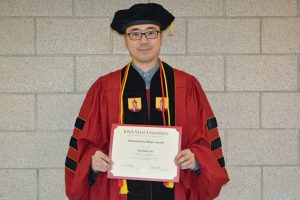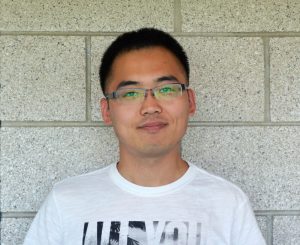The Department of Materials Science and Engineering at Iowa State University recently announced its 2016 Departmental Award recipients.
Trivedi Best Paper Award

Named for MSE Distinguished Professor Rohit Trivedi, the Trivedi Best Paper Award is given annually for the best MSE graduate student paper. The paper must be published or accepted for publication in a peer-reviewed journal and must describe research performed as part of the student’s graduate thesis work.
The recipient of this year’s Trivedi Best Paper Award is Xiaoming Liu. Liu’s paper titled “Giant Strains in Non-Textured (Bi1/2 Na1/2) TiO3-Based Lead-Free Ceramics” was published in Advanced Materials November 24, 2015. With his major professor Dr. Xiaoli Tan, Liu focused on this particular polycrystalline ceramic and found that it can generate a giant electrostrain with a corresponding large-signal piezoelectric coefficient, meaning the ceramic carried the ability to generate a large alternating current (AC) voltage.
This finding could be considered a breakthrough, seeing that the strain value is supposed to be the largest one reported. The lead-free ceramic boasts a 50 percent improvement rate while still maintaining its integrity after 100 electrical cycles, displaying a low rate of fatigue and degradation.
Liu graduated with his Ph.D. in materials science and engineering in fall of 2015. He is currently working as a postdoc in Tan’s research group here at Iowa State, where he continues to work with this ceramic with the hopes of enhancing its fatigue resistance to eventually transfer it into further applications.
The Karl A. Gschneidner “Go for the Gold” Award

Named for the late MSE Distinguished Professor Karl A. Gschneidner Jr., the “Go for the Gold” Award is given annually to an MSE student for the most exciting and breakthrough research carried out in a calendar year. The research may be on any topical area in the field of materials science (ceramics, metals, polymers, electrical and magnetic materials, etc.) and can be experimental, theoretical, or modeling research that is fundamental or applied in nature.
The recipient of this year’s Karl A. Gschneidner “Go for the Gold” Award is Xinchun Tian. Tian is a second-year Ph.D. student working with MSE Assistant Professor Ludovico Cademartiri. Tian’s work focuses on surfaces with superhydrophobicity, or surfaces that can prevent water from sticking to them.
Out of curiosity, Tian burned a small piece of a material called polydimethylsioxane (PDMS) and noticed that the burning resulted in superhydrophobicity. Resulting experiments showed that adding a silicone sealant as the starting material not only enhanced the adherence of the coating but also greatly improved its resistance to high stress and abrasions.
The ability of the surface coating to regenerate itself after exposure to various environmental stressors such as abrasion holds promise for use in alleviating problems such as ice buildup and corrosion. Tian is currently trying to determine the parameters that govern the properties of this water-repellant coating in order to understand how the coatings form and to better understand its processing.
Tian hopes to introduce fillers that can further provide avenues towards self-healing schemes of the coating.